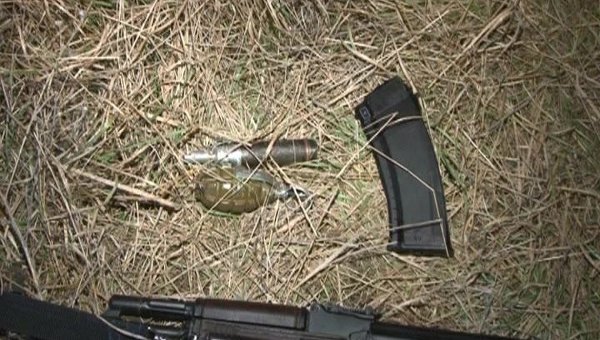
North Caucasus Authorities Unable to End Wave of Rebel and Criminal Extortion
Publication: Eurasia Daily Monitor Volume: 9 Issue: 18
By:

The activities of the resistance movement in the North Caucasus have tended to spread unevenly across the region so far. The northeastern part of the Caucasus has certainly been leading the resistance for the past 12 years. As we move toward the west, from the Caspian Sea to the Black Sea, the intensity of the resistance decreases.
While in 2010, 74 percent of the total number of casualties in the North Caucasus was in Chechnya, Ingushetia and Dagestan (https://chechnya.kavkaz-uzel.ru/articles/179693/); that number rose to 82 percent in 2011.
However, if we look at the region more closely, we see that even within the three northeastern republics the tension declines as one moves from east to west. The vast majority of the casualties are taking place in Dagestan. In 2011, nearly 60 percent of all the casualties in the North Caucasus were in Dagestan (www.apn.ru/news/article25679.htm).
The policies of Russian authorities in the region in fact fuel anti-Russian sentiment in Dagestan. We can see this in the cases of police operations carried out in certain villages. Thus, on October 22, 2011, a counterterrorist operation was launched in the mountainous village of Gimry in Dagestan’s Untsukul district, which is populated by ethnic Avars (https://lenta.ru/news/2012/01/15/protest/). In the beginning of January 2012, the military blocked all roads to the village. During the searches, the police destroyed property and beat up young people. All these abuses forced an estimated 300-1,000 residents of Gimry to go into the streets to protest. It is worth reminding that this particular village is targeted for counterterrorism operations more often than others. Moreover, failing to achieve any meaningful results, the Federal Security Service (FSB) and Interior Ministry have blockaded this village for months at a time, trying to force its residents to put pressure on those among them who either belong to rebel groups or sympathize with them.
For example, military, FSB and Interior Ministry forces blockaded Gimry for seven and a half months – from December 15, 2007 to August 1, 2008. This village is home to one of the leaders of the Gimry jamaat, Ibragim Gadzhidadaev, who claimed responsibility for the assassination of Dagestani Interior Minister Adilgerei Magomedtagirov in 2009 (https://grani.ru/War/m.194839.html). The law enforcement agencies think that young people from central and southern Dagestan are joining this jamaat in particular (https://lenta.ru/news/2012/01/15/protest/). This testifies to the high esteem young adherents of Salafi Islam hold for this regional jamaat. People who participated in the Gimry protest demanded that the authorities clarify the substance of the accusations against them. Few people would have understood exactly what the authorities wanted from them, had not the head of Dagestan, Magomedsalam Magomedov, who is an ethnic Dargin, declared it openly.
According to Magomedov, many businessmen had complained to him that militants had demanded that they pay zakat, or taxes, to them as specified in Islam. Explaining their demands, the militants cited Islamic law as their ideological cover, noting that Sharia requires every businessman to pay a certain percentage of his revenues every year. So the rebels demand that the businessmen admit they are part of Muslim society and comply with its rules. As this type of practice spread across the republic, it apparently acquired such a magnitude that it became impossible to hide. In the view of the Dagestani leader, rebel extortion is driving businesses out of the republic. “How will we feed our people?” Magomedov asked. “Why is it impossible to eliminate these few groups … There are only 250 [rebels]. How many Interior Ministry, FSB and auxiliary forces do we have? There are 20,000 of us” (https://rukavkaz.ru/parts/blogs/828/). Magomedov’s statement resembled more a cry from the heart than comments at a meeting.
The rebels apparently extract tribute from all businessmen, politicians and bureaucrats. But this situation is not new: this extortion has been public knowledge for a decade now, but it was only when it began to affect people close to the ruling government circles in Dagestan that the military was dispatched to Gimry village to stop it.
Nor is this phenomenon unique to Dagestan: it was identified by rights activists in Ingushetia as far back as five years ago (www.memo.ru/hr/hotpoints/caucas1/msg/2007/10/m110681.htm), as well as in Kabardino-Balkaria. It achieved such notoriety that Moscow’s envoy to the region, Aleksandr Khloponin, was forced to admit it (www.rosbalt.ru/federal/2011/03/31/834663.html).
Nor was it a secret to the national media, which as far back as two years ago covered cases of insurgents levying a “tax” on businessmen. Those who sold alcohol were reportedly the main targets of rebel extortion (www.interfax-religion.ru/?act=news&div=35733).
The militants are also often suspected of being responsible for the kidnapping of businessmen by unknown persons. For example, the chief engineer of the Sulak hydroelectric company, Vladimir Redkin, was held captive by unidentified people for eight weeks. Immediately after his kidnapping, Magomedsalam Magomedov was forced to admit that the insurgents “interfere with the activities of the large and medium businesses, try to extort money through blackmail and threats, while the scale of bandit and militant pressure on entrepreneurs is becoming ominous” (www.newsru.com/russia/23jul2010/cascade.html).
Those who indulge in extortion make use of the Internet, flash drives and other electronic media to hide their identities and demand money under the pretext of paying the Islamic zakat. In Islam, this mandatory tax for Muslims is used to help the poor and for Islamic projects designed to spread the religion. It should be noted that ordinary criminals could engage in extortion under the guise of the insurgency. It is therefore not prudent to associate all these cases with the rebels. It is also incorrect to think that this is the rebels’ main source of financing. Whatever the case, the authorities in the North Caucasus seem no closer to ending the wave of extortion in the region.




